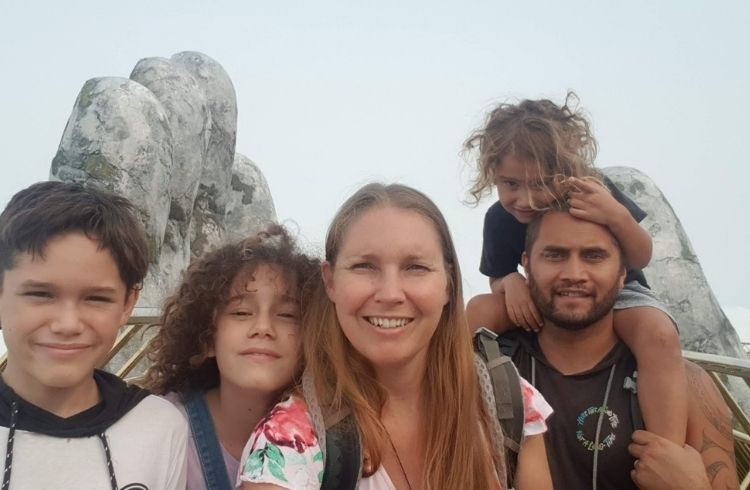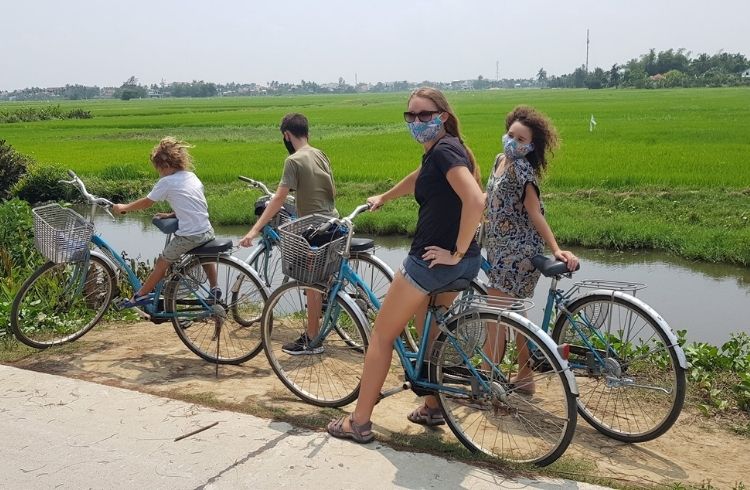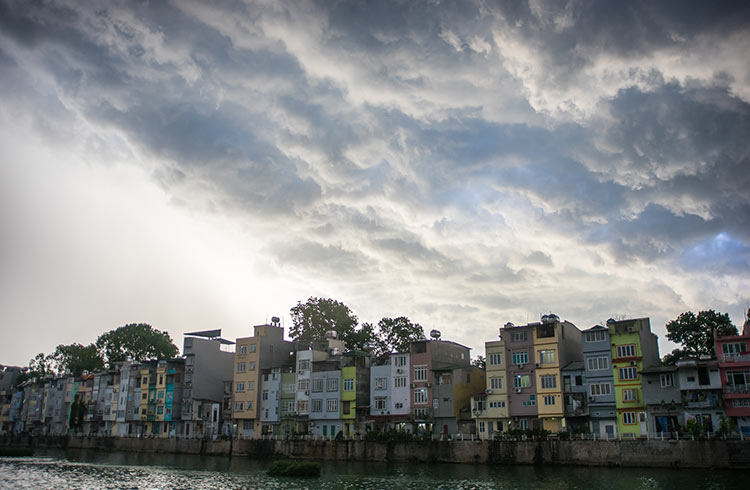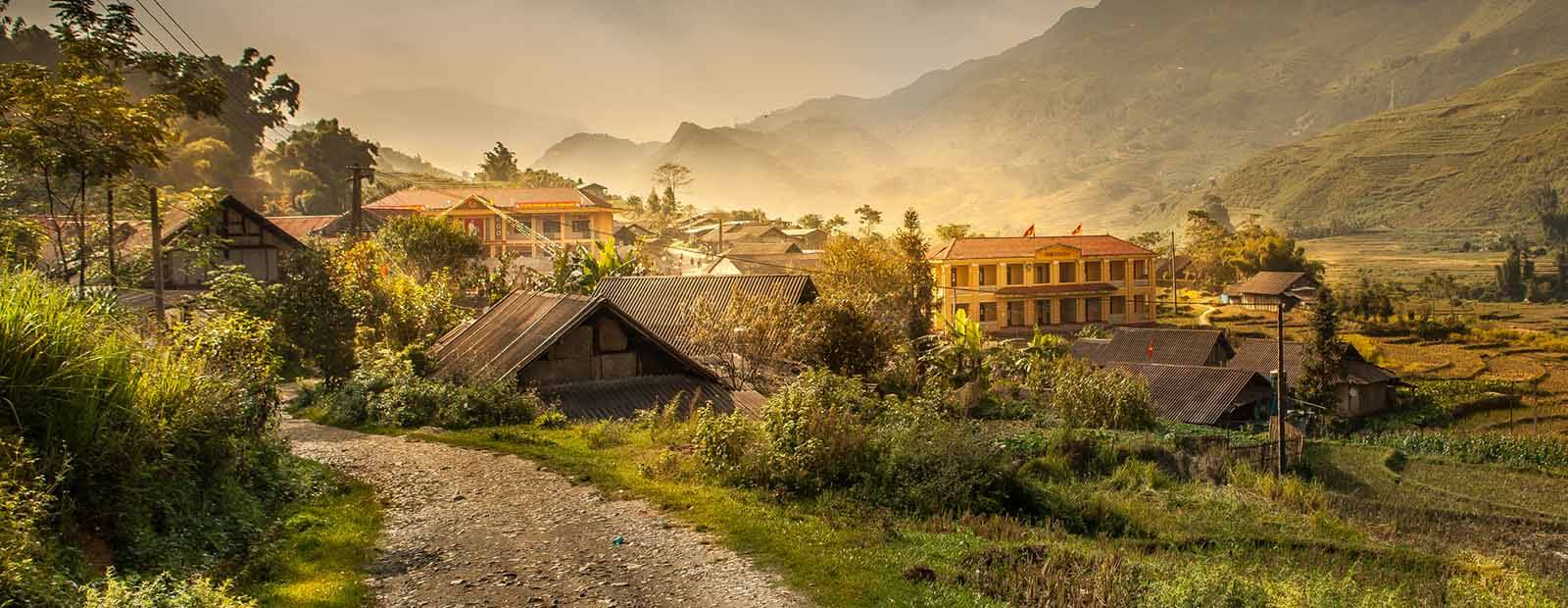The World Nomads Podcast: Stuck in Southeast Asia
In this episode, how being stranded in Vietnam forced this family to rethink the way they’d like to travel the world moving forward.
Shares
 Photo © Supplied
Photo © Supplied
Listen Now
The World Nomads Podcast: Traveling during COVID-19
With COVID-19 still affecting the way we engage with the world, it’s important to plan wisely and travel responsibly, both for your own safety and that of the places you visit. But as we reengage with the world, you're likely planning vacations not far from home. World Nomads can help by providing travel safety tips, inspiring content, and travel insurance designed to protect you while traveling.
Before you buy a travel insurance policy, check your government travel warnings and health advice – there may be no travel insurance cover for locations with a government travel ban or health advice against travel.
What’s in the episode
00:36 Vietnam’s COVID-19 response
01:54 Stumbling across the World Nomads Travel Podcast
04:36 Finding out about coronavirus in Da Nang
07:09 A farm stay in Vietnam
09:17 A change of plans
11:15 The end of the two-week vacation
12:09 Next episode
Quotes from the episode
“I think people can still travel. It's just going to be doing it a little bit differently, isn't it? And it's going to be thinking outside the box.” - Melissa
Who is in the episode
Melissa and her family set off on a two-year trip in February this year but they didn’t get far.
“Thanks, Covid-19! Instead of jet setting speedily across Asia, into Istanbul and over to Europe to walk the Camino de Santiago, we have enjoyed the period of COVID hanging out in the beautiful country of Vietnam.”
You can follow Melissa and her family adventures on Instagram @worldtravelambitions.

Resources & links
Vietnam travel alerts and safety.
Whether it’s a call from your mom or the call of the wild, we’ll help you prepare for your trip and help you stay safe while traveling.
You can get in touch with us by emailing podcast@worldnomads.com.
Help us spread the word
We’d love it if you could please share #TheWorldNomadsTravelPodcast with your twitter followers and head over to Facebook and join the World Nomads Travel Podcast group.
If you liked this episode please head to Apple Podcasts and kindly leave us a rating, review, and of course, subscribe so you don’t miss an episode.
We use the Rodecaster Pro to record our episodes and interviews when in the studio, made possible with the kind support of Rode.
Kim: Thanks for tuning in from wherever you get your favorite podcasts, it’s Kim and Phil with you sharing the story in this episode of a family who launched into a planned trip in February one month before COVID-19 was declared a pandemic and have been in Vietnam since.
Phil: Vietnam acted very early when the virus hit in fact as early as January thinking they were preparing for a strain of acute pneumonia originating from Wuhan, which we now know was coronavirus.
Kim: Despite a population of 97 million at the time of recording in late September 2020 they had just over one thousand cases and 35 deaths. The highest number of cases was in Da Nang, Vietnam’s fifth-largest city by population.
Phil: And despite their success in containing the virus the country is not allowing entry or issuing visas to foreign nationals except for those traveling for official or diplomatic purposes, and they must undergo medical checks and 14-day quarantine at their own expense but for those whose visit is less than 14 days they don’t have to quarantine, but they must comply with Vietnam's COVID regulations.
Kim: Melissa and her family kicked off what was going to be a two-year family vacation and in her research stumbled across the World Nomads Travel Podcast.
Melissa: Well, I was just online looking for just more inspiration and having a look at what was out there. And as well, just feeling like at the moment it's hard to travel, as you know, and trying to figure out how to get anywhere or where you can go and things like that. So, I've been looking on heaps of sites of what countries are open and that sort of thing. And I thought, why don't I have a look and see if there's someone just updating and what's going on. So, you came up in a search and it was like, okay, awesome. There's something that I can tune into and listen to from time to time. So, it's actually really cool, and some of the stuff that you guys have got on there, I actually really enjoyed the one that you did recently with the rooted storytelling. It was really cool.
Kim: Yeah, on sustainable and ethical travel. Yeah, absolutely.
Melissa: Yeah.
Kim: You picked a terrible time to start a two-year world trip. February, you left Australia, in March everything fell apart, Melissa.
Melissa: We didn't get far, no. The reason that we stayed was that I wrote this trip down on my dreams in 2010. At the time, I was a single mom. I was rebuilding my life after family violence, and so had just no hope really, but I wrote it down anyway. I was like, "I want to travel the world with my kids." So, we've been saving and planning for this for five years, and we arrived in Vietnam on the 6th of March.
Phil: Oh, no.
Kim: Well, you have to laugh.
Melissa: You have to laugh. You have to laugh because I think in some ways it's the unluckiest thing, but in other ways, it's been the luckiest thing that's ever happened to us. So-
Kim: Well, a good country to land in, too.
Phil: Hang on, hang on. Why? Why has it been lucky?
Melissa: Because I'm in Vietnam, and everyone in the rest of the world has been in and out of all these insane lockdowns, and we've cruised through. We have been so lucky. I'll tell you, it was really scary. So when we arrived, everything was fine. We did the trip out to the Củ Chi tunnels, we did the War Remnants Museum, everything was okay. We had arrived in Saigon, and that was the first time we'd been here and thinking, "Oh my gosh, this is madness." Then people are like, "Oh no, this is quiet." I was like, "I don't ever want to see this place busy."
Melissa: We flew up to Da Nang on the 10th of March and that day I'm so glad we didn't check the news. But the lady at our homestay, she gave us the face masks and she said, "You must wear these at the airport." We're like, "Oh no, it's fine. Vietnam's fine, we're fine, it's good." She's like, "No, seriously, wear these." We hadn't read the news. It wasn't until we arrived in Da Nang and my three year old got a fever and we started having a freakout.
Phil: Uh Oh.
Melissa: We contacted one of my friends who happened to live in Da Nang, and she was like, "Um, haven't you heard? There's a massive outbreak, and this lady's being traipsing around Vietnam, spreading COVID everywhere." I went, "What the?" We were-
Kim: That's why I was going to say you're lucky because Vietnam was very proactive. They had some comprehensive measures in place very, very quickly, and they've done very well, almost the poster country for COVID.
Melissa: Exactly. Yeah, so it was freaky at the time because it was so new and it was so unexpected. Then we had this kid with a fever and when we told the reception at the hotel, they looked like they just wanted to die. But it worked out okay because we'd flown in from New Zealand, they couldn't trace any possibility of us being in contact with any non-cases. So he went to the hospital, they checked him out made sure it wasn't [inaudible 00:03:50] or anything like that, no COVID test at that point, and sent him home. We just were like, "Okay, we'll just hide from everybody and hope that we don't have it."
Melissa: Then we moved over to Hội An on the 19th of March when everything was starting to really drastically escalate, and we made a call, we sort of said, "Well, okay, this country's looking like it's going to go shut down really quick, what town do we want to be in?" We basically could choose from Da Nang or Hội An. We chose Hội An, and we ended up in this beautiful villa, overlooking the rice fields with a swimming pool. We were there for a month. The only tricky thing in that time was we had to do COVID tests.
Melissa: So, we had to do the whole blood test, throat test, up the nose. And, that was the entire family. That's got to be probably the hardest day of my mothering life, I think.
Kim: Are you still a single mother?
Melissa: No, no. Well, I got married, me and my husband got married in Cooke Islands in 2014. So yeah, since then we've been planning this trip.
Phil: Can you do me a favor, because I'm not allowed to travel anywhere at the moment, but not quite clearly, the noise of Hội An is going on in the background. Can you just not say anything for a minute so I can just listen and pretend I'm there?
Melissa: Well, now I'm actually not in Hội An anymore.
Phil: Where are you now?
Melissa: We're in the beautiful Phong Nha, it's a farm state. And so you sort of said, well, why is it lucky? Because we spent one month in Hội An, and then it was fire season where they burn the crops. And so we moved from Hội An to the beachfront of An Bang. And we spent a month there and these are things that we wouldn't have done. You know, originally we had on our plan, we were going to spend about five weeks in Asia because we had pre-booked our flight from Singapore to Istanbul.
Melissa: We had planned to do, we're world schoolers. So we've got three kids, and my two are older. So they're 13 and 11. We were planning to [inaudible 00:05:53]. We were going to travel Turkey for a month, And then we were going to go over to Spain and walk the Camino. Instead, we spent April beachfront An Bang in the most beautiful villa, which we just would not have done at all. And then at the end of that, we felt like Vietnam was pretty much COVID free. We'd got on top of it here, as the country, it was doing so well. So we thought, right, we'll go traveling and we've traveled the whole Northern region of Vietnam.
Melissa: We've been all the way out to Ban Gioc, which is actually on the border of Vietnam and China. We've done Cao Bằng, Ba Be Lake. We spent two weeks out in Sa Pa, and we came down to Ninh Bình. And, that's when this recent outbreak happened. So, that's why we're now in Phong Nha.
Phil: How long do you have to stay where you are?
Melissa: Oh gosh, that's the difficult thing. Because, we sold everything, right. We sold everything. Like I sold the cars, we sold everything we owned.
Melissa: We didn't actually own a house. So we gave up our beautiful rental. So our home in Australia is not there. And, then we're New Zealand citizens, so we thought about going back potentially to New Zealand. So we're kind of thinking, we need to figure out how we can get longterm visas, looking at being in Vietnam and watching the world unfold and then sort of trying to switch off as much as we can but watching it unfold again, I kind of get the vibe that this thing's not going away in the short to midterm. And I feel like, we may be here for two or three years. So our strategy going forward is to work out where we can get long term visas, and plan to just travel for a year at a time in one country. And if that means we have to stay put on a beach somewhere, because my husband's desperately missing surfing.
Melissa: We'll just try and find a place that can take us, that we can physically get to. So that's part of the biggest challenge right now. It's not even if we wanted to go home. Back in March, we got that call from our New Zealand embassy. They said you should go home. You should go home. And we looked around and there were a lot of people booking flights. Like a lot of people don't even realize there was a lot of people booking flights and they were getting canceled. They were going to turn up in the airport and they'd get canceled or even worse. They'd be one leg into their flight, and then the next leg gets canceled and they're stuck on the airport floors and things. And I just thought at the time there was so much panic and I was like, I don't want to subject my kids to crazy airports and flights where people are panic flying home, if we don't have to. I don't want them to be put into the more likely bracket of possibly picking up COVID en route home. So, we chose not to go then.
Melissa: And then, when things started to sort of settling down and people were flying, we sort of just thought, well, can't drag out that long can it? Like that was my mindset. It was like, it's not going to drag on for more than two months. And then we've sort of got to now and it's sort of looking like we probably don't really want to go home. If we booked September, there's no guarantee of flight. That becomes tricky. So we've just changed our plan and thought well we'll figure out how we can do this safely and sensibly and not, we don't want to be gallivanting around, especially in areas where there is outbreaks. We'll just, we'll sit tight when these outbreaks, but we'd still like to see more of the world. So it's, going to be different. It really is. It's not, going to be viable to take a two-week vacation internationally for quite some time I think, for a lot of us, especially Down Under. Europe, they are doing okay at the moment. But being sensible, and looking at how we navigate for the next two years, it is more sensible to try and do these big, longer trips. And so for us, we want to see the world. So we're going to set a date.
Phil: I think it's amazingly inspirational to think that you can still travel and some of those experiences despite it all as well.
Melissa: Yeah, I think people can still travel. It's just going to be doing it a little bit differently, isn't it? And it's going to be thinking outside the box.
Kim: I have been told if you don’t come out of COVID having changed something for the best, then you have missed an opportunity. Slow travel, a year in each country, love it well done Melissa.
Phil: To get in touch and share how COVID has changed you email podcast@worldnomads.com
Kim: Next week with the world slowly moving again we revisit our episode on Ecuador with all the information you need to know to get into the country and be COVID safe.
Bye




1 Comment
Pls URgent...reminder
I need to know how to complain about heathrow airport > email adress and airline refusing to refund air ticket...and ignoring complaints and a friend needs to know about French ombudsman
Regards